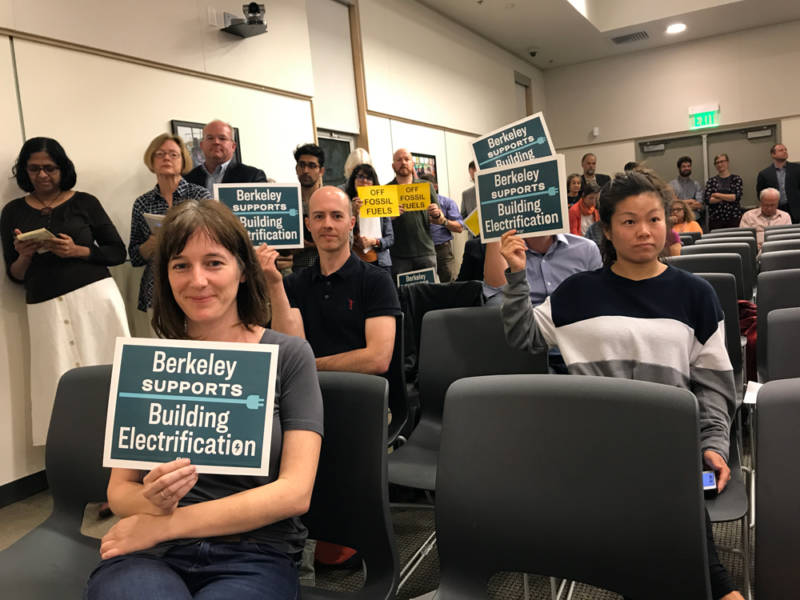Berkeley will no longer allow natural gas pipes to be installed in most new buildings starting next year, becoming the first city in California to pass such restrictions.
Berkeley Becomes First City in California to Ban Natural Gas in Most New Buildings

The Berkeley City Council voted unanimously Tuesday night in favor of the legislation, put forward by Councilwoman Kate Harrison and council co-sponsors Cheryl Davila, Ben Bartlett and Sophie Hahn.
Public support was also unanimous during 45 minutes of comment from community members and representatives of the University of California’s Office of the President (UCOP), energy giant PG&E and the Sierra Club, among others who spoke.
Ryan Bell, UCOP's sustainability director, told officials the university is on board with the idea and, as of July 1, already has a policy, to avoid natural gas space and water heating in most new facilities. The university has all-electric buildings — from labs and dormitories to office space — going up around the state “in all climate zones,” Bell said.
“This is proving to be a cost-effective way to meet our greenhouse gas reduction goals, saving money in all building types,” he added. “Having a strong policy is essential to overcoming ‘business as usual’ in development practices and encourage the next generation of buildings being constructed.”
The crowd applauded PG&E's Darin Cline when he made the utility company’s position clear: “PG&E supports local government policies that promote all-electric new construction.”
In her initial presentation, Harrison noted that electricity is easier and faster than gas to reinstate after a power outage and that, in Berkeley, electricity is cleaner than gas: at least 78% carbon-free.
Laws like this are important, according to the ordinance and prior city policies, because Berkeley is in the midst of a “climate emergency.” Natural gas makes up 27% of Berkeley’s greenhouse gas emissions and 73% of its building sector emissions, Harrison said. Despite stalwart efforts, the city is “approximately 18% behind its 2020 [Climate Action Plan] goal and will fall short of its ultimate goal of net zero emissions by 2050.”
“We have to take more drastic action,” Harrison said during her comments on the dais.
“The effect of this legislation will be that builders will be prohibited from applying for entitlements that include gas infrastructure — gas piping to heat water, space, food, etc. — except for specific building systems that have not yet been modeled for all-electric design” by the state, according to the council report on the ordinance.
The new law, which goes into effect in January, will apply only to building types that have been reviewed and analyzed by the California Energy Commission. Each time the state expands its models and analyses, the city will be able to update its law without returning to the council for a new vote.
Natural gas may be allowed in new projects if an applicant can show that “it is not physically feasible to construct the building” without it, according to the ordinance language. But new construction must be built so it can be converted to all-electric in the future.
The new ordinance includes exemptions for internal accessory dwelling units (those built inside an existing home) as well as projects that the city’s Zoning Adjustments Board or planning staff determine are in the public interest. The law includes a recommendation for a two-year staff position, paid for through the city’s excess equity fund.
Harrison’s presentation included a fondue demonstration by a staffer who set up an electric induction burner, then melted chocolate and dipped fresh strawberries into it. To show how safe the burner was, the staffer placed a sheet of paper between the burner and a pot to prove that the paper would not catch fire as the chocolate melted.
Multiple speakers during public comment said they had shifted from gas to induction burners in their Berkeley homes and were happy with the change.
California Energy Commission Chairman David Hochschild, who has lived in Berkeley for nearly a decade, told officials he was very much in favor of the ordinance. He said it would be yet another chance for Berkeley to be a trendsetter.
“You see those changes go to other cities, then go up to the state level and then go to the national level,” Hochschild said. “That’s how change happens.”
California, he noted, has a state mandate in place to get to 100% clean energy by 2045, and electrification is the next step in that endeavor. Fifty other cities in the state are “actively considering” legislation related to phasing out natural gas, he told the council, “but Berkeley’s the first, thanks to you.”
Mayor Jesse Arreguín picked up on that theme: “Ideas start here and movements are born here,” he said of Berkeley. Phasing out natural gas is a necessary action, he added, “not some radical pie-in-the-sky idea.”
Arreguín credited Councilwoman Davila for her resolution in 2018 to declare a climate emergency in Berkeley. He said that helped set the stage for Tuesday night’s electrification ordinance.
In her remarks, Davila said it was her son who motivated her to put forward last year’s climate emergency resolution.
“This is exactly what we wanted and dreamed and hoped for,” she said. “This is just the beginning.”
This article was republished with permission from Berkeleyside.